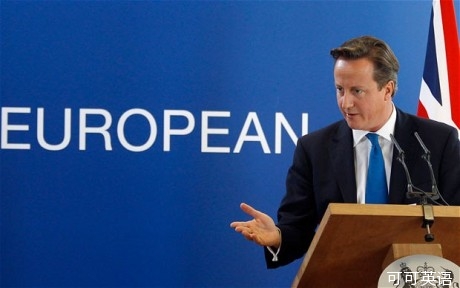(单词翻译:单击)

The coinages Brexit and Brixit are a tongue-in-cheek reference to Great Britain no longer being part of the European Union – in other words a British exit or Britain exiting from the EU. The terms immediately gained wider exposure with the Prime Minister's announcement on January 23rd, which confirmed that the UK government would take definite steps to legislate for a referendum on EU membership before leaving office, and if re-elected would hold this referendum before the end of 2017.
Brexit和Brixit是对英国退出欧盟的一种戏虐说法,即British exit or Britain exiting from the EU(英国退出欧盟)。1月23日英国首相卡梅伦就是否退出欧盟发表讲话后,这两个词立即广泛传播。卡梅伦在讲话中表示,在离任前要就欧盟成员问题逐步实现依法全民公投;如果获得连任,将在2017年底前就此进行全民公投。
The terms Brexit and Brixit first appeared in June 2012, the latter allegedly coined by a columnist in The Economist, and the former by nationalist organization The British Resistance.
Brexit和Brixit这两个词最早出现在2012年6月,Brixit由《经济学人》杂志一位专栏作家首创,而Brexit则出自民族主义组织“英国抵抗”。
The words were most likely inspired by the term Grexit, which had appeared in February 2012 and refers to the possibility of Greece leaving the Eurozone (the group of EU countries which use the Euro as a unit of currency). The term Fixit, referring to the possibility of Finland doing the same, also appeared in June 2012.
这两个词的灵感很可能来源于2012年2月份出现的Grexit一词,这个词指希腊退出欧元区的可能性。2012年6月还出现Fixit一词,指芬兰退出欧元区。


